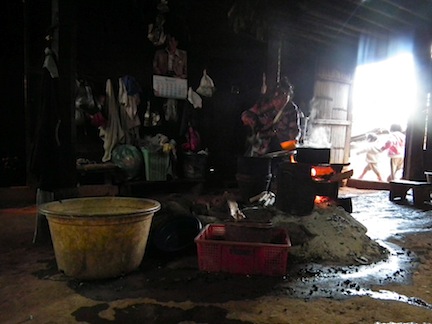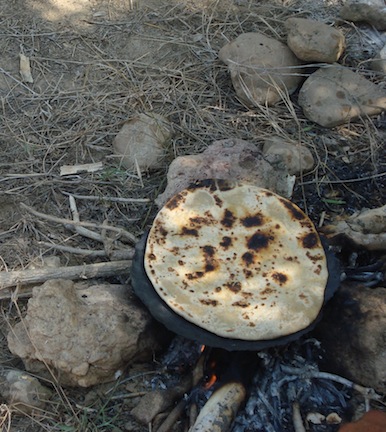Keeping Kosher when Visiting a Tribal Home (Mong New Year)
One of the most difficult things to do when you are a kosher traveler is to visit a local, tribal home. That is because in most cultures, the offering of food to guests is very important. Yet, as a kosher traveler, we have to turn down these offers. In most cultures, turning down an offer of food is very rude. So what to do?

Inside a native Hmong (Mong) home, our hostess prepares an elaborate breakfast to celebrate the New Year. To refuse to eat anything at all would be incredibly rude, but what could we eat and still keep kosher?
Imagine you meet a visitor traveling from a faraway country and culture you have never even heard of before. You are excited to get to know them and invite them to your home for a Friday night Shabbat dinner, to show them your home and culture. When they get there, they refuse to eat, but happily sit through the whole meal not touching a thing. Awkward at best, this could be downright insulting.
Fortunately, most of us Westerners have come into contact with people with other religious and cultural beliefs that affect food consumption. We understand (because we keep kosher) that perhaps a Muslim will only eat what is halal. We can understand the strict Buddhist tenant not to eat after noon. We can even grasp the Jain concept of not eating, breathing, or even walking on bugs.
But people from small native villages don’t have this exposure. The concept of refusing to eat a meal with your hosts can be deeply insulting. So what do you do?
Firstly, it depends on the level of kashrut you are keeping. If for you eating vegetarian food is kosher, then you can probably get by with only minor challenges. But if you keep strictly kosher, you will have a harder time.
In some cultures, such as the Hmong (Mong) and Thai cultures, rice is a staple food. These cultures will have a special pot set aside for cooking rice and nothing but rice will be cooked in it. You can probably help them check the rice (they usually check it for stones, but you can always help them look and look for bugs instead!) and then offer to help stoke the fire or add the rice to the pot, so that you are participating in the cooking process. If you pose it as wanting to be involved in, learn about, and participate in their culture, they will usually be enthusiastic about you helping with the cooking process.
At least then you can manage to eat some plain rice.
The same kind of process usually applies to whatever the staple food of the culture is, whether it is rotis, bread, or chapatis. Most of these foods require a special dish to cook in and you can help with the cooking process in some way without offending your hosts.
Any other kind of food cooked in the place you are visiting is likely to be too difficult to make kosher, unless you managed to find a tribe of vegetarians (they do exist, but I haven’t found them yet). Otherwise, it’s likely that food will get mixed up and even a purely vegetarian dish will not meet kosher standards. For example, at the Hmong home we visited during the Mong New Year this week, they prepared a vegetarian dish of pumpkin – after chopping it directly on the same chopping block as the pork, without washing it in between. So that dish was clearly not kosher.
Stick with the plain rice or chapatis and you’ll be fine, or at least less awkward. And if you can’t manage to do that, at least in a Buddhist country you can always explain that you only have fresh fruit and water after noon!
Happy eating and happy travels!
Read More





